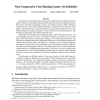Free Online Productivity Tools
i2Speak
i2Symbol
i2OCR
iTex2Img
iWeb2Print
iWeb2Shot
i2Type
iPdf2Split
iPdf2Merge
i2Bopomofo
i2Arabic
i2Style
i2Image
i2PDF
iLatex2Rtf
Sci2ools
136
click to vote
MST
2010
2010
Non-Cooperative Cost Sharing Games via Subsidies
We consider a cost sharing system where users are selfish and act according to their own interest. There is a set of facilities and each facility provides services to a subset of the users. Each user is interested in purchasing a service, and will buy it from the facility offering it at the lowest cost. The overall system performance is defined to be the total cost of the facilities chosen by the users. A central authority can encourage the purchase of services by offering subsidies that reduce their price, in order to improve the system performance. The subsidies are financed by taxes collected from the users. Specifically, we investigate a non-cooperative game, where users join the system, and act according to their best response. We model the system as an instance of a set cover game, where each element is interested in selecting a cover minimizing its payment. The subsidies are updated dynamically, following the selfish moves of the elements and the taxes collected due to their pa...
Hardware | Model | MST 2010 | Payments | Subsidy Mechanism |
Related Content
| Added | 20 May 2011 |
| Updated | 20 May 2011 |
| Type | Journal |
| Year | 2010 |
| Where | MST |
| Authors | Niv Buchbinder, Liane Lewin-Eytan, Joseph Naor, Ariel Orda |
Comments (0)

